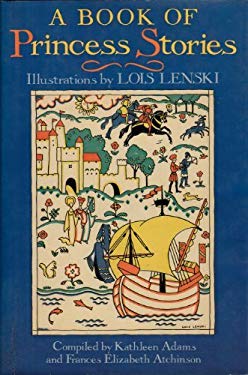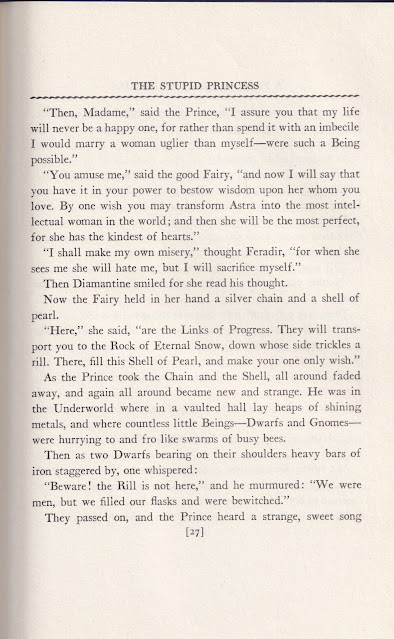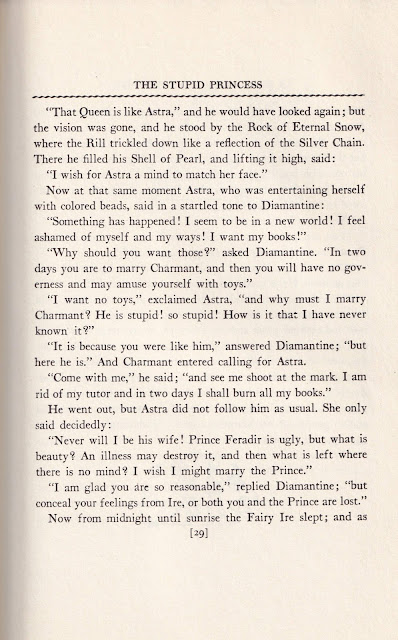Which is better to be beautiful or smart? A Book of Princess Stories has just entered the Public Domain and proves to be the perfect time to consider that question!
Public Domain activist that I am, I have more to say about that after today's story. The trio of books (A Book of Giant Stories, 1926; A Book of Princess Stories, 1927; A Book of Enchantment, 1928) by the storytelling team of Kathleen Adams and Frances Elizabeth Atchinson presents a perfect example of the importance of Public Domain . . . the sooner, the better!
As storytellers the idea of a curse being changed by the intervention of another is not unusual. This story is different from Sleeping Beauty, but you will certainly think of that story, too.
The book is not available online yet so this is scanned from my own copy as best I could reproduce it.
I called the authors a Storytelling Team for the only clue I've been able to unearth is that their three books came as the result of their telling a cycle of stories on the topic at the Indianapolis Public Library. Children attending the storytellings clamored for more. My checking produced no biographical information about them online, including at the Indianapolis Public Library, nor in reference books about children's authors. My findings about the storytelling came from the Preface to their first book, A Book of Giant Stories, which last year became Public Domain. Next year their third and last book, A Book of Enchantment finally will become Public Domain. This trio of books isn't easily found and the fact that the first book just became available a year ago makes it especially hard. It also is a perfect reason for Public Domain. I hope the books will now begin to be reprinted and more widely known. If they become available online I will be especially happy.
Duke University's Center for the Study of the Public Domain did an excellent job of looking at the better known entrants for this year. Beyond that, however, drop down to the section titled "The Best Things in Life Are Free" (that song appropriately entered Public Domain this year). Examples like The Great Gatsby and Winnie-the-Pooh are used to show the value of the Public Domain to creativity, cultural access, and unedited history. A further section called "The Tip of the (Melting) Iceberg" shows:
For the vast majority—probably 99%—of works from 1927, no copyright holder financially benefited from continued copyright. Yet they remained off limits, for no good reason. (A Congressional Research Service report indicated that only around 2% of copyrights between 55 and 75 years old retain commercial value. After 75 years, that percentage is even lower. Most older works are “orphan works,” where the copyright owner cannot be found at all.)
Further down, the section "Oh NO, Canada!" talks about how their copyright laws have take a step the other way:
On December 30, 2022, Canada is freezing its public domain for the next 20 years with its C-19 copyright law. Yes, that’s right, Canada is doing the same thing the US did in 1998, with all of the negative effects that have now been well documented.
The verdict is in: adding an extra 20 years to the US copyright term was a “big mistake.” This is not a quote from someone who is equivocal about copyright; it is a quote from the former head of our Copyright Office. Indeed, there is a consensus among policymakers, economists, and academics that lengthy copyright extensions impose costs that far outweigh their benefits. Why? The benefits are minuscule—economists (including five Nobel laureates) have shown that term extension does not spur additional creativity. At the same time, it causes enormous harm, locking away millions of older works that are no longer generating any revenue for the copyright holders. Films have disintegrated because preservationists can’t digitize them. The works of historians and journalists are incomplete. Artists find their cultural heritage off limits. (See studies like the Hargreaves Review commissioned by the UK government, empirical comparisons of the availability of copyrighted works and public domain works, and economic studies of the effects of copyright.)
There's more in the article, but the reason this is happening is when countries "comply with trade deals that require harmonization of copyright terms. With harmonization, there is a catch: countries are always made to harmonize with the longer term, never the shorter term, even if the shorter term is a better choice for both economic and policy reasons."
My Public Domain "soapbox" has many people seeing the foolishness of delaying Public Domain, but the part that can be extremely difficult is when the status is based on the life of the creator. Today's pair of authors have no documented dates of death. U.S. works created since 1978 have the life-plus-70 term. The E.U. does this, too, although their specifics can be even a bit more complicated.
Fortunately, as long as you are not recording a specific work (print, video are the main ways), you are able to tell a story and let it blow into your audience's minds like a dandelion seed on the wind.
Keep on telling!
*****************
This is part of a series of postings of stories under the category, "Keeping the Public in Public Domain." The idea behind Public Domain was to preserve our cultural heritage after the authors and their immediate heirs were compensated. I feel strongly current copyright law delays this intent on works of the 20th century. My own library of folklore includes so many books within the Public Domain I decided to share stories from them. I hope you enjoy discovering new stories.
At the same time, my own involvement in storytelling regularly creates projects requiring research as part of my sharing stories with an audience. Whenever that research needs to be shown here, the publishing of Public Domain stories will not occur that week. This is a return to my regular posting of a research project here. (Don't worry, this isn't dry research, my research is always geared towards future storytelling to an audience.) Response has convinced me that "Keeping the Public in Public Domain" should continue along with my other postings as often as I can manage it.
Other Public Domain story resources I recommend-
There are many online resources for Public Domain stories, maybe none for folklore is as ambitious as fellow storyteller, Yoel Perez's database, Yashpeh, the International Folktales Collection. I have long recommended it and continue to do so. He has loaded Stith Thompson's Motif Index into his server as a database so you can search the whole 6 volumes for whatever word or expression you like by pressing one key. http://folkmasa.org/motiv/motif.htm
You may have noticed I'm no longer certain Dr. Perez has the largest database, although his offering the Motif Index certainly qualifies for those of us seeking specific types of stories. There's another site, FairyTalez claiming to be the largest, with "over 2000 fairy tales, folktales, and fables" and they are "fully optimized for phones, tablets, and PCs", free and presented without ads.
Between those two sites, there is much for story-lovers, but as they say in infomercials, "Wait, there's more!"










No comments:
Post a Comment